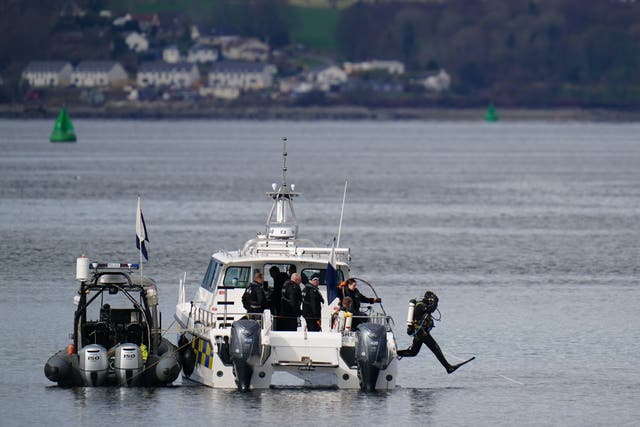A tug capsized in less than 10 seconds with the loss of two lives because of a “breakdown of the systems that should have kept them safe”, marine investigators have found.
The Biter capsized while towing the passenger vessel Hebridean Princess towards James Watt Dock in Greenock on February 24, 2023.
Tug master George Taft, 65 and deckhand Ian Catterson, 73, were unable to escape and their bodies were recovered from the vessel’s wheelhouse by Police Scotland divers the following day.
A Marine Accident Investigation Branch (MAIB) investigation found Biter was affected by “girting” forces and capsized because it was unable to reverse direction to operate directly astern of the passenger vessel before the tug’s weight came on to the towing bridle.

When this happened a rope on the tug called the “gob rope” did not prevent it being towed sideways and the rope rendered.
Investigators also found an open accommodation hatch compromised the tug’s watertight integrity and limited the crew’s chance of survival as it was highly unlikely any air was trapped in the wheelhouse when the vessel tipped over.
The MAIB investigation found the Clydeport marine pilot’s training had not prepared them to work with conventional tugs such as Biter.
It also found master/pilot and pilot/tug exchanges were incomplete and, with no shared understanding of the plan, the passenger vessel’s master and the tug masters were unable to challenge the pilot’s intentions.
Andrew Moll, chief inspector of marine accidents, said: “Tug Biter’s accident was another cruel lesson of how rapidly things can go dreadfully wrong.
Today, we have published our report on the investigation of the capsize and sinking of the tug Biter, with the loss of two lives, while assisting the passenger vessel Hebridean Princess off Greenock, Scotland on 24 February 2023.https://t.co/UY5y8cl0QP
— MAIB (@maibgovuk) November 13, 2024
“In less than 10 seconds the tug capsized, and two experienced seafarers lost their lives, because of a breakdown of the systems that should have kept them safe.
“Small conventional tugs remain an essential part of UK port operations. However, the vulnerabilities of these vessels must be understood by those that operate and control them.
“Harbour authorities, ship and tug masters, and pilots should collectively own this risk. Pilots and tug crews must be suitably trained and experienced for their roles, and they must share a detailed understanding of the towage plan before they start the job.
“Speed, which has an exponential effect on towing forces, must be carefully controlled and the lines correctly set.
“Everyone involved must then monitor the execution of the plan and, if needed, act to keep everyone safe.”
The investigation also found Hebridean Princess’s speed of 4.6 knots (kts) meant the load on Biter’s towlines was between two and five times more than it would have been at the recommended lower speed of 2-3kts.

It said given the tug’s rapid capsize, it was unlikely its crew had sufficient time to operate the emergency tow release mechanism.
The MAIB has recommended Clyde Marine Services Limited, the tug’s owners, review its safety management system and risk assessments to provide clear guidance on the rigging of the gob rope; the safe speed to conduct key manoeuvres, and that it adopts a recognised training scheme for its tug masters.
Recommendations have also been made to Clydeport Operations Limited to commission an independent review of its marine pilot training and to risk assess and review its pilot grade limits and tug matrix.
A spokesperson for Clyde Marine Services said: “We acknowledge the release of the Marine Accident Investigation Branch report. We will take time to review and consider it.
“Our thoughts remain with the families affected and Clyde Marine Services will continue to co-operate fully with ongoing official investigations.”
Jim McSporran, port director, Clydeport, said: “We note the findings from the MAIB report and will consider its recommendations in detail.
“Above all, our deepest sympathy goes to the families, friends and colleagues of the two men who died in this tragic incident.
“The health, safety and the welfare of our employees and the third parties we work with is, and always will be, our number one priority.”
The MAIB has also made recommendations to professional associations representing pilots, harbour masters, and tug owners to develop appropriate guidance on the safety issues raised in its report.




Why are you making commenting on The National only available to subscribers?
We know there are thousands of National readers who want to debate, argue and go back and forth in the comments section of our stories. We’ve got the most informed readers in Scotland, asking each other the big questions about the future of our country.
Unfortunately, though, these important debates are being spoiled by a vocal minority of trolls who aren’t really interested in the issues, try to derail the conversations, register under fake names, and post vile abuse.
So that’s why we’ve decided to make the ability to comment only available to our paying subscribers. That way, all the trolls who post abuse on our website will have to pay if they want to join the debate – and risk a permanent ban from the account that they subscribe with.
The conversation will go back to what it should be about – people who care passionately about the issues, but disagree constructively on what we should do about them. Let’s get that debate started!
Callum Baird, Editor of The National
Comments: Our rules
We want our comments to be a lively and valuable part of our community - a place where readers can debate and engage with the most important local issues. The ability to comment on our stories is a privilege, not a right, however, and that privilege may be withdrawn if it is abused or misused.
Please report any comments that break our rules.
Read the rules here